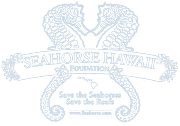Ocean Rider Seahorse Farm and Tours | Kona Hawaii › Forums › Seahorse Life and Care › Discolored Male Seahorse
- This topic has 1 reply, 2 voices, and was last updated 18 years, 1 month ago by Pete Giwojna.
-
AuthorPosts
-
June 8, 2006 at 11:16 pm #836gdietzMember
My male seahorse is suddenly showing a significant loss of color on his abdomen and sides. He was perfectly normal a few days ago, went thru a courting ritual and seems OK. He was still eating yesterda, but seems a little sluggish today. I can best describe him as \"blotchy\" looking with lots of white (he is normally red with some white). Any insight would be greatly appreciated.
Greg Dietz
June 9, 2006 at 10:30 pm #2579Pete GiwojnaGuestDear Greg:
I am not at all sure what to make of your blotchy, discolored seahorse. There are a number of conditions that can cause discoloration or depigmentation of the skin, but in the initial stages these tend to result in a localized loss of pigmentation or white patches, rather than the overall blotchiness you seem to be describing. For example, when discoloration results from white patch disease (marine columnaris), or protozoan parasites that attack the skin, or the initial stages of marine ulcer disease, the white patch or loss of pigmentation is typically localized and confined to a specific area, rather than extending over both sides of the seahorse generally.
The fact that your seahorse’s normal color pattern includes some white areas, and that the change in coloration that you are concerned about began when he was courting makes me wonder if what you are seeing is his typical courtship coloration. The characteristic change in coloration that occurs during courtship is known as "brightening" because the seahorse becomes lighter in coloration at this time. During brightening, the the head, dorsal surface (i.e., back), and ventral line (keel) of the seahorse normally remain quite dark while the rest of the body becomes lighter and more conspicuous (Vincent, 1990). For example, Mustangs (Hippocampus erectus) are typically dark brown or black in coloration, but when courting they often assume pearly, pale gray, or whitish coloration over most of their bodies.
If the change in your seahorse’s coloration — becoming lighter with lots of white — corresponds with his courtship rituals and displays, he may simply be brightening to make himself more conspicuous in order to attract a mate. Does his head, dorsal surface, and midline (ventral keel) remain dark or normally colored in contrast to the white areas, Greg?
If so, the change in coloration is probably nothing to be concerned about. As long as your male is behaving normally otherwise, eating well, and displaying a healthy interest in romance, he should be fine.
For now, I would just keep a close eye on him and and watch for anything out of the ordinary. Let me know immediately if he goes off his feed or you notice any other symptoms other than the change in coloration. In that event, I will go over the different health problems that can cause discoloration in seahorses and how to treat those conditions with you right away.
Best of luck with your seahorses, Greg!
Respectfully,
Pete Giwojna -
AuthorPosts
- You must be logged in to reply to this topic.





